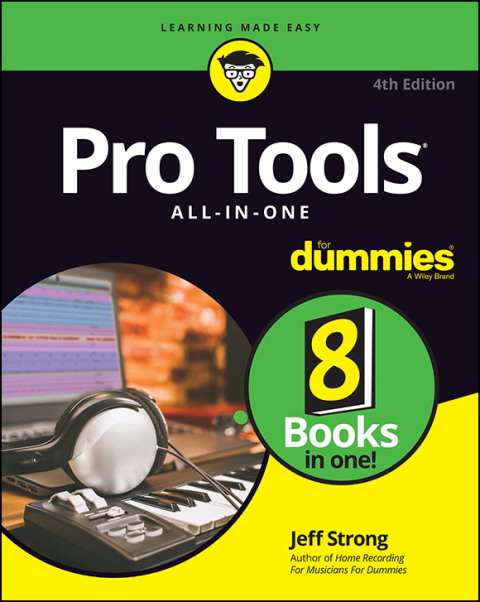Description
Efnisyfirlit
- Cover
- Introduction
- About This Book
- Foolish Assumptions
- Icons Used in This Book
- Beyond the Book
- Where to Go from Here
- Book 1: Getting Started with Pro Tools
- Chapter 1: Discovering What You Need
- Eyeing the Big Picture
- Piping the Music into Pro Tools
- Meeting the Mixer
- Managing the MIDI Controller
- Recognizing the Recorder
- Signing On to Signal Processors
- Making Sense of Monitors
- Mastering Media
- Chapter 2: Configuring Your Computer
- Using Pro Tools on a Mac
- Using Pro Tools on a PC
- Keeping Bugs at Bay: Good Habits to Get Into
- Chapter 3: Choosing and Setting Up Your Hardware
- Examining Audio Interface Specifications
- Exploring Some Popular Audio Interfaces
- Exploring Avid’s Eleven Rack
- Connecting Your Audio Interface
- Chapter 4: Examining Software Basics
- Keeping Software Straight
- Getting Set Up
- Dealing with Sessions
- Getting to Know Audio and MIDI Files
- Book 2: Understanding Recording Basics
- Chapter 1: Getting Connected: Setting Up Your Studio
- Understanding Analog Connections
- Delving In to Digital Connections
- Working Efficiently in Your Studio
- Optimizing Your Studio
- Chapter 2: Understanding Signal Flow
- Meeting the Many Mixer Types
- Understanding Mixer Basics
- Routing/Busing Signals
- Deciphering Output Jacks
- Making Life Easier with a Patch Bay
- Chapter 3: Understanding the Pro Tools Windows
- Tackling the Transport Window
- Examining the Edit Window
- Managing the Mix Window
- Working with Window Configurations
- Chapter 4: Importing and Exporting Files
- Importing into a Session
- Exporting from a Session
- Managing Files
- Book 3: Recording Live Audio and Acoustic Instruments
- Chapter 1: Taking Care of Tracks
- Understanding Tracks in Pro Tools
- Setting Up Tracks
- Altering Your View of Tracks
- Grouping Tracks
- Soloing and Muting
- Managing Track Voices
- Chapter 2: Understanding Microphones
- Meeting the Many Microphone Types
- Assessing Your Microphone Needs
- Deciding How Many Microphones and What Kind
- Finding the Right Mic for the Situation
- Partnering Mics with Preamps
- Considering Compressors
- Looking at Preamp, Compressor, and Equalizer Combos
- Analyzing Some Microphone Accessories
- Caring for Your Microphones
- Chapter 3: Miking: Getting a Great Source Sound
- Tracing Typical Microphone Techniques
- Taming Transients
- Setting Up Your Mics: Some Suggestions
- Chapter 4: Preparing to Record
- Recognizing Record Modes
- Dealing with Disk Allocation
- Enabling Recording
- Setting Levels
- Setting a Record Range
- Monitoring Your Tracks
- Creating a Click Track
- Chapter 5: Recording Audio
- Recording Tracks
- Playing Back Your Tracks
- Doing Additional Takes
- Getting Rid of Unwanted Takes
- Book 4: Recording Electronic Instruments with MIDI
- Chapter 1: Understanding Electronic Instruments and MIDI
- Meeting MIDI
- Getting Started with MIDI
- Chapter 2: Preparing to Record MIDI
- Setting Up Your MIDI Devices
- Getting Ready to Record
- Chapter 3: Recording Electronic Instruments with MIDI
- Recording MIDI Performances
- Playing Back Your Tracks
- Getting Rid of Unwanted Takes
- Overdubbing MIDI Performances
- Recording System-Exclusive Data
- Book 5: Editing Your Performances (Audio and MIDI)
- Chapter 1: Audio Editing Basics
- Understanding Pro Tools Editing
- Getting to Know Clip Types
- Viewing Clips
- Understanding Edit Modes
- Working (Okay, Playing) with Playlists
- Using the Audio Clips List
- Managing Undos
- Chapter 2: Selecting Material to Edit
- Selecting Track Material
- Making Changes to Your Selection
- Managing Memory Locations
- Playing Selected Material
- Chapter 3: Getting into Editing
- Editing Clips
- Examining Edit Commands
- Exploring Elastic Audio
- Chapter 4: Adding to Your Audio Editing Palette
- Signing On to the Smart Tool
- Perusing the Pencil Tool
- Silencing Selections
- Performing Fades and Crossfades
- Cleaning Up Your Session
- Chapter 5: Editing MIDI Data
- Working with MIDI and Instrument Tracks
- Dealing with Note Chasing
- Editing MIDI in the Edit Window
- Exploring MIDI Events
- Chapter 6: Performing MIDI Operations
- Getting Used to the MIDI Operations Window
- Performing MIDI Event Operations
- Recognizing MIDI Real-Time Properties
- Book 6: Mixing
- Chapter 1: Mixing Basics
- Understanding Mixing
- Managing Levels as You Work
- Getting Started Mixing Your Song
- Mixing In Pro Tools
- Using the Stereo Field
- Adjusting Levels: Enhancing the Emotion of the Song
- Tuning Your Ears
- Chapter 2: Setting Up Your Mix
- Revisiting the Mix Window
- Getting to Know Signal Flow
- Rounding Out Your Routing
- Accessing Output Windows
- Playing with Plug-ins
- Processing with External Effects
- Chapter 3: Using Equalization
- Exploring Equalization
- Dialing In EQ
- Equalizing Your Tracks
- Chapter 4: Digging into Dynamics Processors
- Connecting Dynamics Processors
- Introducing Compressors
- Looking into Limiters
- Introducing Gates and Expanders
- Detailing the De-Esser
- Setting Up Side Chains
- Chapter 5: Singling Out Signal Processors
- Routing Your Effects
- Rolling Out the Reverb
- Detailing Delay
- Creating Chorus Effects
- Chapter 6: Automating Your Mix
- Understanding Automation
- Accessing Automation Modes
- Setting Automation Preferences
- Enabling Automation
- Writing Automation
- Viewing Automation
- Drawing Automation
- Thinning Automation
- Editing Automation Data
- Chapter 7: Making Your Mix
- Submixing by Recording to Tracks
- Mixing in-the-Box
- Using an External Master Deck
- Book 7: Mastering
- Chapter 1: Mastering Basics
- Demystifying Mastering
- Getting Ready to Master
- Paying a Pro, or Doing It Yourself
- Hiring a Professional Mastering Engineer
- Chapter 2: Mastering Your Music
- Considering General Guidelines
- Setting Up a Mastering Session
- Optimizing Dynamics
- Perfecting Tonal Balance
- Balancing Levels
- Mastering Your Mix
- Sequencing Your Songs
- Book 8: Getting Your Music to the Masses
- Chapter 1: Putting Your Music on CD and Vinyl
- Getting into CD Burning
- Purchasing CD-Rs
- Recording Your Music to CD-R
- Making Multiple Copies
- Pressing Vinyl
- Promoting Your Music
- Chapter 2: Getting Your Music on the Internet
- Understanding Downloadable Music Files
- Creating MP3 Files
- Setting Up Your Own Music Website
- Putting Your Music on a Music Host Site
- Engaging in Social Media Networking
- Offering Free Downloads
- Selling Your Music Digitally
- Licensing Your Music
- Podcasting
- Selling Your CDs
- Promoting Your Music
- Connecting with an Email Newsletter
- About the Author
- Connect with Dummies
- Index
- End User License Agreement







Reviews
There are no reviews yet.